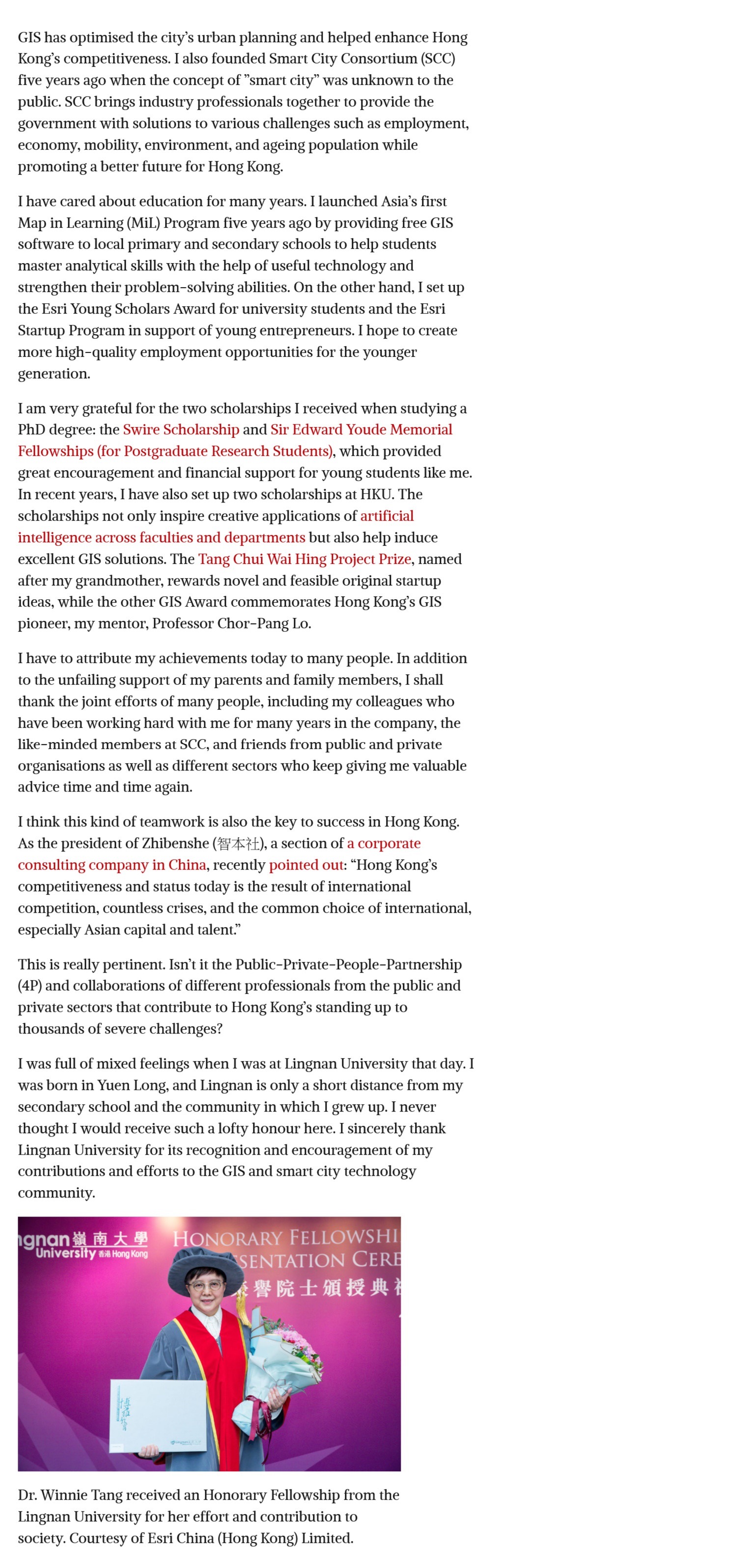網上版請按此


Collaboration is the key to success: Reflections upon receiving the Honorary Fellowship from Lingnan University
In the midst of golden autumn, I was excited to receive the Lingnan University's Honorary Fellowship. On 30 October, more than 20 beloved family members, mentors and friends took their precious time to attend the presentation ceremony – I was very touched! It was also a great honour to receive the congratulatory letters from the President of Baptist University and the President of my alma mater, the University of Hong Kong (HKU).
I was brought up by my grandmother, who passed away more than 20 years ago, and her teachings have stayed with me to this day. She told me to make a contribution to society, which is in line with the motto of my primary school: "Not to be served but to serve."
This motto has echoed throughout my life. I was driven to introduce geographic information systems (GlS) to Hong Kong despite all kinds of difficulties, making Hong Kong Asia's leader in GIS application. The biggest difficulty I encountered in the early days of my business was the lack of understanding of GIS in the government, public and private sectors of Hong Kong. I was frequently rejected and given the cold shoulder, and did not begin earning until after 11 months of operation. At that time, everyone was used to hand-drawn paper maps, and nobody appreciated the importance of using advanced technology in urban planning and city management or location data for big data analysis and decision making.
GIS has optimised the city's urban planning and helped enhance Hong Kong's competitiveness. I also founded Smart City Consortium (SCC) five years ago when the concept of "smart city" was unknown to the public. SCC brings industry professionals together to provide the government with solutions to various challenges such as employment, economy, mobility, environment, and ageing population while promoting a better future for Hong Kong.
I have cared about education for many years. I launched Asia's first Map in Learning (MiL) Program five years ago by providing free GIS software to local primary and secondary schools to help students master analytical skills with the help of useful technology and strengthen their problem-solving abilities. On the other hand, I set up the Esri Young Scholars Award for university students and the Esri Startup Program in support of young entrepreneurs. I hope to create more high-quality employment opportunities for the younger generation.
I am very grateful for the two scholarships I received when studying a PhD degree: the Swire Scholarship and Sir Edward Youde Memorial Fellowships (for Postgraduate Research Students), which provided great encouragement and financial support for young students like me. In recent years, I have also set up two scholarships at HKU. The scholarships not only inspire creative applications of artificial intelligence across faculties and departments but also help induce excellent GIS solutions. The Tang Chui Wai Hing Project Prize, named after my grandmother, rewards novel and feasible original startup ideas, while the other GIS Award commemorates Hong Kong's GIS pioneer, my mentor, Professor Chor-Pang Lo.
I have to attribute my achievements today to many people. In addition to the unfailing support of my parents and family members, I shall thank the joint efforts of many people, including my colleagues who have been working hard with me for many years in the company, the like-minded members at SCC, and friends from public and private organisations as well as different sectors who keep giving me valuable advice time and time again.
I think this kind of teamwork is also the key to success in Hong Kong. As the president of Zhibenshe (智本社), a section of a corporate consulting company in China, recently pointed out: "Hong Kong's competitiveness and status today is the result of international competition, countless crises, and the common choice of international, especially Asian capital and talent."
This is really pertinent. Isn't it the Public-Private-People-Partnership (4P) and collaborations of different professionals from the public and private sectors that contribute to Hong Kong's standing up to thousands of severe challenges?
I was full of mixed feelings when I was at Lingnan University that day. I was born in Yuen Long, and Lingnan is only a short distance from my secondary school and the community in which I grew up. I never thought I would receive such a lofty honour here. I sincerely thank Lingnan University for its recognition and encouragement of my contributions and efforts to the GIS and smart city technology community.
Dr. Winnie Tang
Adjunct Professor, Department of Geography, Faculty of Social Sciences and Faculty of Architecture, The University of Hong Kong